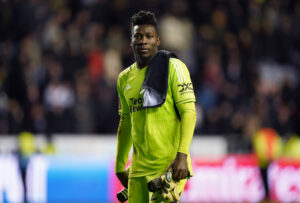Famous Five: This series looks at a match or event from the world of football which is making the news and draws comparisons with similar players, matches or events from football history. In the wake of the much-publicised bust-up between Neymar and Edinson Cavani over who should take a penalty, this edition looks at five other famous penalties from football history.
For the Famous Five article on 0-0 draws, click here.
The extraordinary and extraordinarily spat between Neymar and Edinson Cavani last weekend, when they argued over who should take a vital penalty late on in Paris Saint-Germain’s match against Lyon, has already taken its place among the most famous penalties in football history. These five penalties are famous for very different reasons.
The Johann Cruyff and Jesper Olsen Double Act
Penalties are supposed to be one-man shows, with just one player taking responsibility for the unimpeded shot from the 12-yard spot. However, as he did in so many other areas of football, Johan Cruyff reinvented the way that penalties were taken. He did so in December 1982, against Helmond Sport, when he was in his second stint with Ajax. Rather than just take the penalty himself, he played a one-two with Jesper Olsen, the young Danish international, before finally and very calmly slotting the return ball into the net.
The Cruyff-Olsen double act has been repeated several times since, most notably by Lionel Messi and Luis Suarez for Barcelona in 2016, but perhaps the best homage to it was a missed penalty. That was in 2005 when, for once, Arsenal’s Thierry Henry and Robert Pires misplaced their usual telepathy and between them bungled a spot-kick against Manchester City. The fact that even two such gifted players as Henry and Pires, who were usually on the same wavelength, could spectacularly fail to recreate the Cruyff-Olsen original was probably the ultimate proof of the original’s high tariff of difficulty.
Stuart Pearce and Chris Waddle, Italia 1990
Stuart Pearce and Chris Waddle’s own “double act” for England in 1990 was rather less successful than that of Cruyff and Olsen eight years earlier. Rather than scoring one memorable penalty between them, Pearce and Waddle both missed spot-kicks as England lost to West Germany at the World Cup in Italy.
Six years later in the quarter-final at Euro 96, Pearce was able to redeem himself partially when he scored one of the penalties that gave England its only shoot-out victory at a major tournament against Spain. Nevertheless, given that England would go on to lose on penalties again to the reunified Germany in another semi-final, Pearce, like Waddle, remains more associated with missing a penalty than with scoring one.
Andreas Brehme, Italia 1990
It perhaps says everything about the generally low quality of the 1990 World Cup that it was ultimately won by a penalty, and a penalty that is largely forgotten today, at least outside of Germany.
Andreas Brehme’s successful spot-kick in the 85th minute, after Argentina had already been reduced to nine men, was a great moment for West Germany. For the watching billions, however, it seemed emblematic of a mainly defensive and at times downright ugly tournament. England fans in particular, having lost to West Germany in the semi-final just a few days earlier and having been cheated out of another semi-final by Argentina’s Diego Maradona four years before that, could not have been blamed for thinking, “A curse on both your houses”.
The 1974 World Cup Final
It is fascinating to consider just how many of the most famous penalties appear to come in pairs, or at least involve two players, including the Cruyff-Olsen double act and the misses by Pearce and Waddle. For what is supposedly the ultimate act of footballing individualism—one attacking player against one goalkeeper—penalties are often associated not with just one attacking player but with two.
The most famous pair of penalties in football history came in the 1974 World Cup final, when both the Netherlands and West Germany were awarded spot-kicks, the first and so far only time that that has happened in the most prestigious game in football. The Netherlands’ penalty came barely a minute into the match, when the sublime Cruyff slalomed his way through an apparently stunned German defence before being brought down by Uli Hoeness. The other great Johan—Neeskens—scored from the spot and it appeared inevitable that the Dutch would go on to claim their first global title.
Of course it was not to be like that. In the 25th minute, they won a penalty of their own, when their left-winger, Bernd Hölzenbein, was fouled in the box. Astonishingly, it was one of West Germany’s youngest players, the full-back Paul Breitner, who took the penalty and scored. Typically, however, Gerd Muller got the winner, just before half-time, as the West Germans punished the Dutch’s inability to convert their chances when they were on top early on and ultimately won their second World Cup and first on home soil.
The Panenka
Famous as they undoubtedly are, the other penalties on this list still require a little introduction, but that is not the case with the most famous penalty of all, “the Panenka”. It is named after the man who scored it, Antonin Panenka, when he brilliantly but oh-so-softly chipped Germany’s great Sepp Maier to score the winning penalty in the first ever major international tournament to be decided on penalties.
Indeed, the Panenka is not just the most famous penalty in football history but arguably the single most famous movement or action of any kind in football history. To this day, it remains the only movement or action that is known only by the name of its inventor. Even the fabled “Cruyff turn”, against Sweden in the 1974 World Cup finals, is precisely that – a “turn”. It is not known as “the Cruyff”, whereas “the Panenka” is quite simply called that, and rarely requires expansion or further explanation as “the Panenka penalty”.
That is also because the Panenka has been repeated many times since, to the point where it is undeniably a viable option for any penalty-taker anywhere. Very recently, Aaron Ramsey repeated it in a World Cup qualifier for Wales against Serbia this summer, although he admitted afterwards that he had been completely unaware that Panenka had scored the original “Panenka” in the same stadium more than 40 years before.
Nevertheless, he had continued in the fine penalty-scoring tradition that Antonin Panenka had first established, which is likely to remain part of the game long after the pathetic squabble between Neymar and Cavani is consigned to history.
Main Photo






